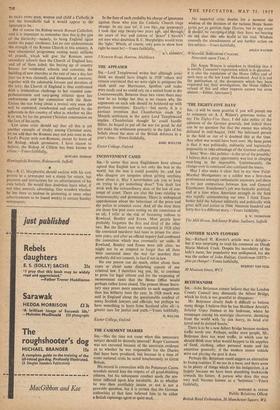INCONVENIENT CASES
SIR,—It seems that most Englishmen have always agreed that English law is not only the best in ' the world, but the best it could possibly be; , and few who disagree are sanguine about getting anything done about it. May I _nevertheless ask you to keep on trying to get something done? You dealt last week with the extraordinary state of the law of con- tempt of court. There are also the laws relating to homosexuality and prostitution. There is widespread apprehension about the behaviour of the press and the police in criminal cases. And all the time there are those few past cases resting on the conscience of us all; I refer at the risk of becoming tedious to Rowland, Bentley and Evans. Most people have probably forgotten the first and tired of the other two. But the Slater case wa's reopened in 1928 after the convicted 'murderer had been in prison for nine- teen years, and after an official inquiry had confirmed the conviction which was eventually set aside., If Rowland, Bentley and Evans were still alive, we might not be so tempted to forget that all three were convicted since the war for murders they probably did not commit, in fact if not in law. No one person can do much, either about these cases or about some disturbing aspects of our criminal law. I therefore beg you, Sir, to continue to press for legal reform and for the reopening of inconvenient cases that the Home Office would perhaps rather leave closed. The present Home Secre- tary may prove more amenable to such suggestions than has hitherto been the case. In 1928 much was said in England about the questionable conduct of many Scottish lawyers and officials; but perhaps we have something to learn from Scotland after all—a greater care for justice and truth.=-Yours faithfully, N. WALTER Exeter College, Oxford










































 Previous page
Previous page